牛津英语四年级下册知识点整理
深圳市沪教牛津版四年级英语(下)册知识点总结

Unit1Touch and feel1.学会询问触觉感受的句子,如:Touch this.How does it feel?2.学会使用一些形容词来描述物品的特点,如:It’s soft./It’s hard.3.学会根据触觉来猜测物品,如:—It's hard.—What is it?—Is it an apple?—Yes,it is.touch碰;触摸feel摸起来;感到soft柔软的hard坚硬的thick厚的;粗的thin薄的;细的hear听到young年轻的noise响声;吵闹声men男人(复数)blind瞎的;失明的1.—Touch this,Alice.How does it feel?摸摸这个,Alice。
感觉它是怎样的?—It's soft.它是软的。
2.Well done!做得很好。
Unit2Smell and taste1.学会使用“看”、“闻”和“尝”三个感官动词,如:①Look,Joe.②Smell this.③Taste it.2.学会使用选择疑问句,如:Is it strawberry juice or watermelon juice?3.学会使用形容词来对事物进行描述和判断,如:It's sweet and sour.It’s strawberry juice!grape葡萄strawberry草莓watermelon西瓜juice果汁smell闻;嗅taste品尝sweet甜的sour酸的or或者;还是wait等待;等候minute一会儿;分钟get得到fox狐狸round圆的purple紫色的those那些1.I have some juice here.我这儿有些果汁。
2.Smell this.闻闻这个。
3.Is it strawberry juice or watermelon juice?这是草莓汁还是西瓜汁?4.Taste it.尝尝它。
牛津英语四年级下册知识点整理.docx
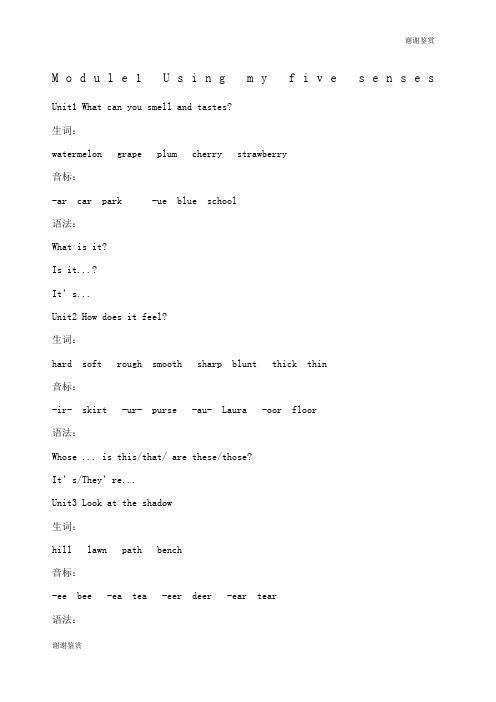
M o d u l e1U s i n g m y f i v e s e n s e s Unit1 What can you smell and tastes?生词:watermelon grape plum cherry strawberry音标:-ar car park -ue blue school语法:What is it?Is it...?It’s...Unit2 How does it feel?生词:hard soft rough smooth sharp blunt thick thin音标:-ir- skirt -ur- purse -au- Laura -oor floor语法:Whose ... is this/that/ are these/those?It’s/They’re...Unit3 Look at the shadow生词:hill lawn path bench音标:-ee bee -ea tea -eer deer -ear tear语法:It + v.(does)...Module2 My favourite thingsUnit1 Sports生词:play football play table tennis play volleyball play badminton play basketball音标:-i- five -ie pie语法:Does...like...(doing)?Yes,...does. / No,...doesn’t.Unit2 Cute animals生词:bone cat food parrot fish dog food tortoise音标:-oe Joe -oa- goat -o Flo语法:What does...(do)?...(does)...Eg: What animals do you like? I like cats.What food does a cat eat? It eats cat food.Unit3 Home life生词:bedroom living room bathroom kitchen音标:谢谢鉴赏-oy toy -oi- noise语法:...am/is/are...(doing)Module3 Things around usUnit1 Sounds生词:quiet loud bell television音标:-are square -ear bear -air hair语法:Is/are...(doing)?Yes,...is/are. No,...isn’t/aren’t.Unit2 Time生词:seven o’clock a quarter past seven half past seven a quarter to eight get up brush my teeth wash my face have breakfast音标:-ou- mouse ow- owl语法:What are you doing?I’m...What time is it?It’s...Unit3 Days of the week生词:谢谢鉴赏always usually often sometimes never音标:-ay May -ai- wait语法:What do you usually do?Sb. Usually/often/always/sometimes/never ...Module4 More things to learnUnit1 A music class生词:piano violin triangle drum音标:Where’s...?It’s...Whose...is this?It’s...Unit2 Festivals in China生词:the Spring Festival the Dragon Boat Festival the Middle-autumn Festival the Double Ninth Festival语法:When is ...Festival?Is it hot/sunny/...at...Festival?What do you do in ...Festival?What special food do you eat at...?Unit3 Story time谢谢鉴赏生词:duckling swan nest。
沪教牛津版小学四年级下册英语知识清单

沪教牛津版小学四年级下册英语知识清单Module 1Using my five senses一、核心词汇1. 水果名词:strawberry 草莓watermelon 西瓜grape 葡萄2. 时间名词:noon 中午evening傍晚;晚上night 夜晚minute 一会儿;分钟3. 名词:noise响声;吵闹声fox狐狸shadow影子moon 月亮sky 天空4. 感官动词:touch 碰;触摸feel 摸起来;感到smell 闻;嗅5. 动词:wait等待;等候get得到rise升起stop停下6. 形容词:soft 柔软的hard 坚硬的thick厚的;粗的thin薄的;细的blind 瞎的;失明的young 年轻的round 圆的purple紫色的high 高的7. 副词:again再;又8. 代词:those 那些him他9. 连词:or 或者;还是10. 短语:at noon 在中午go down 落下at night 在夜晚take a walk 散步二、拓展词汇1. 颜色名词:white 白色black 黑色red 红色green 绿色yellow黄色2. 水果名词:apple 苹果pear 梨banana 香蕉3. 名词:sun 太阳star 星星4. 动词:see 看见taste 品尝hear 听5. 形容词:long 长的short 短的sweet 甜的sour 酸的old 老的三、核心句型1. —How does it feel? 感觉如何?—It’s soft. 它是柔软的。
解读:这是询问对某物的触觉感觉的句型及其回答。
举一反三:—How do the apples feel? 这些苹果你感觉如何?—They are hard. 它们是硬的。
2. —What is it? 它是什么?—It’s a toy bear. 它是一只玩具熊。
解读:这是询问物品名称的句型及其回答。
沪教牛津版四年级英语下册各单元知识点汇总
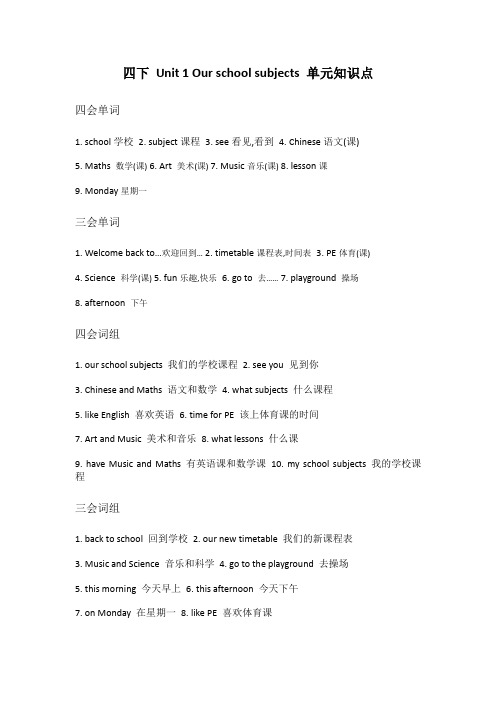
四下Unit 1 Our school subjects 单元知识点四会单词1. school学校2. subject课程3. see看见,看到4. Chinese语文(课)5. Maths 数学(课)6. Art 美术(课)7. Music音乐(课)8. lesson课9. Monday星期一三会单词1. Welcome back to…欢迎回到…2. timetable课程表,时间表3. PE体育(课)4. Science 科学(课)5. fun乐趣,快乐6. go to 去……7. playground 操场8. afternoon 下午四会词组1. our school subjects 我们的学校课程2. see you 见到你3. Chinese and Maths 语文和数学4. what subjects 什么课程5. like English 喜欢英语6. time for PE 该上体育课的时间7. Art and Music 美术和音乐8. what lessons 什么课9. have Music and Maths 有英语课和数学课10. my school subjects 我的学校课程三会词组1. back to school 回到学校2. our new timetable 我们的新课程表3. Music and Science 音乐和科学4. go to the playground 去操场5. this morning 今天早上6. this afternoon 今天下午7. on Monday 在星期一8. like PE 喜欢体育课9. don’t like that 不喜欢那个10. don’t skate 不要滑冰11. make a cake 做一个蛋糕12. at school 在学校四会三会句型1. Welcome back to school, class. 欢迎回到学校,同学们。
牛津版英语四年级下册知识点总结

牛津版英语四年级下册知识点总结摘要:一、牛津版英语四年级下册知识点概述1.课程教材简介2.知识点涵盖范围二、Unit 1 - Using My Five Senses1.单元主题2.核心词汇3.语法知识点三、Unit 2 - My Family1.单元主题2.核心词汇3.语法知识点四、Unit 3 - Food and drinks1.单元主题2.核心词汇3.语法知识点五、Unit 4 - Time1.单元主题2.核心词汇3.语法知识点六、Unit 5 - We Love Animals1.单元主题2.核心词汇3.语法知识点七、Unit 6 - My Holiday1.单元主题2.核心词汇3.语法知识点八、Unit 7 - My Day1.单元主题2.核心词汇3.语法知识点九、Unit 8 - Days of the Week1.单元主题2.核心词汇3.语法知识点十、Unit 9 - A Friend in Australia1.单元主题2.核心词汇3.语法知识点正文:一、牛津版英语四年级下册知识点概述牛津版英语四年级下册教材,以生动有趣的主题为核心,通过丰富的语言实践活动,帮助学生全面提高英语能力。
本册教材共包括九个单元,涉及的主题有:使用五官、家庭、食物和饮料、时间、动物、假期、日常生活、一周七天以及国际友谊。
二、Unit 1 - Using My Five Senses本单元的主题是“使用五官”。
学生将学习如何用英语描述视觉、听觉、嗅觉、味觉和触觉的体验。
通过本单元的学习,学生能够更好地理解和运用相关的词汇和表达。
三、Unit 2 - My Family本单元的主题是“我的家庭”。
学生将学习如何用英语介绍家庭成员、职业和家庭关系。
通过本单元的学习,学生能够更好地掌握家庭成员的词汇和相关的语法结构。
四、Unit 3 - Food and Drinks本单元的主题是“食物和饮料”。
学生将学习如何用英语描述各种食物和饮料的名称、味道和喜好。
四年级英语下册Module2知识梳理(牛津上海版试用本)

M2U1 Sports知识梳理一、重点词汇(需背默):sport运动、club俱乐部、play football踢足球、play table tennis打乒乓(= play ping pong)、play volleyball打排球、play badminton打羽毛球、play basketball 打篮球、poster海报、else其他的、join参加,加入、never从不、notice通知,注意、swimsuit游泳衣、goggles护目镜、remember记住、before在…之前(指时间,反义词是after)、healthy健康的、spare节省,空闲的、paint画画、line 线,排、mine我的(名词性物主代词)、smile微笑、french fries薯条、hobby 兴趣(复数hobbies)二、重点词组(需背默):badminton club羽毛球俱乐部、my favourite sport我最喜欢的运动、join the club 参加俱乐部、would like to do sth.=want to do sth. 想做某事、play…with sb.和某人一起玩……、talk with sb. 和某人交谈、get in your eyes进入你的眼睛、warmup exercises热身运动、go into the swimming pool进入游泳池、make sb. healthy使某人健康、enjoy oneself过得快乐、in a line在一条线上三、重点句型(需背默):1、Would you like to join the badminton club? Yes, I’d like to./Yes, I’d love to.你想参加羽毛球俱乐部吗?是的,我愿意。
(Would you like to …的问句语气比较客气)2、Would you like to join the volleyball club? I’d like to, but I can’t play volleyball. 你想参加排球俱乐部吗?我很想参加但是我不会打排球。
最新牛津英语四年级下册知识点梳理
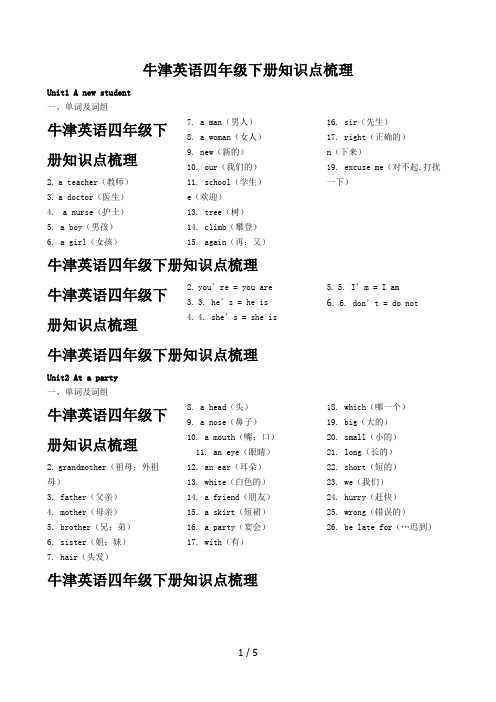
牛津英语四年级下册知识点梳理Unit1 A new student一、单词及词组牛津英语四年级下册知识点梳理2.a teacher(教师)3.a doctor(医生)4. a nurse(护士)5. a boy(男孩)6. a girl(女孩)7. a man(男人)8. a woman(女人)9. new(新的)10. our(我们的)11. school(学生)e(欢迎)13. tree(树)14. climb(攀登)15. again(再;又)16. sir(先生)17. right(正确的)n(下来)19. excuse me(对不起,打扰一下)牛津英语四年级下册知识点梳理牛津英语四年级下册知识点梳理2.you’re = you are3.3. he’s = he is4.4. she’s = she is5.5. I’m = I am6.6. don’t = do not牛津英语四年级下册知识点梳理Unit2 At a party一、单词及词组牛津英语四年级下册知识点梳理2.grandmother(祖母;外祖母)3. father(父亲)4. mother(母亲)5. brother(兄;弟)6. sister(姐;妹)7. hair(头发)8. a head(头)9. a nose(鼻子)10. a mouth(嘴;口)11. an eye(眼睛)12. an ear(耳朵)13. white(白色的)14. a friend(朋友)15. a skirt(短裙)16. a party(宴会)17. with(有)18. which(哪一个)19. big(大的)20. small(小的)21. long(长的)22. short(短的)23. we(我们)24. hurry(赶快)25. wrong(错误的)26. be late for(…迟到)牛津英语四年级下册知识点梳理Unit3 What’s your job?一、单词及词组1. a policeman (policemen)(警察)2. a policewoman (policewomen)(女警察)3. a waiter (waiters)(男服务员)4. a waitress (waitresses)(女服务员)5. a driver (drivers)(司机)6. a worker (workers)(工人)7. a cook (cooks)(厨师) 8. a farmer (farmers)(农民)9. job(职业) 10. name(名字) 11. their(他(她/它)们的) 12. today(今天)13. old(老的) 14. about(大约) 15. want(想要) 16. cold(冷的)17. how old(几岁) 18. how many(多少) 19. look at(看)二、缩写词1. aren’t = are not2. what’s = what is3. they’re = they are三、句型1. What’s your job?(你的职业是什么?)I’m a…(我是一位…)What’s his job?(他的职业是什么?)He’s a…(他是一位…)What’s her j ob?(她的职业是什么?)She’s a…(她是一位…)2. What are their jobs?(他/她们的职业是什么?)They’re…(他/她们是…)3. Are they…?(他/她们是…吗?) Yes, they are.(是,他/她们是的。
牛津英语四年级下册知识点精编WORD版
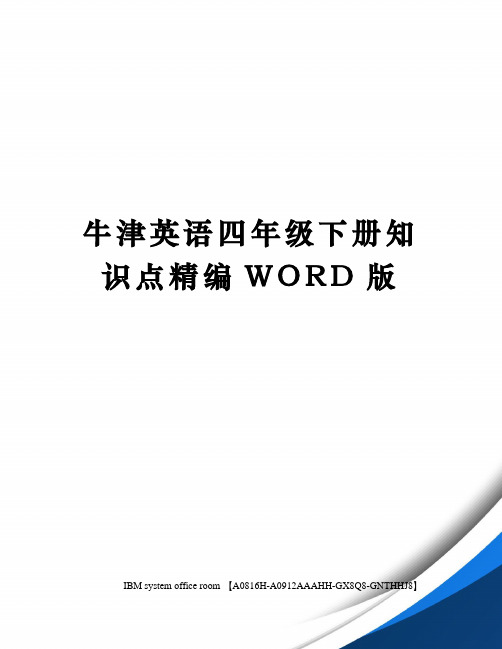
牛津英语四年级下册知识点精编W O R D版 IBM system office room 【A0816H-A0912AAAHH-GX8Q8-GNTHHJ8】M o d u l e1U s i n g m y f i v e s e n s e s Unit1 What can you smell and tastes?生词:watermelon grape plum cherry strawberry音标:-ar car park -ue blue school语法:What is it?Is it...?It’s...Unit2 How does it feel?生词:hard soft rough smooth sharp blunt thick thin音标:-ir- skirt -ur- purse -au- Laura -oor floor语法:Whose ... is this/that/ are these/those?It’s/They’re...Unit3 Look at the shadow生词:hill lawn path bench音标:-ee bee -ea tea -eer deer -ear tear语法:It + v.(does)...Module2 My favourite thingsUnit1 Sports生词:play football play table tennis play volleyball play badminton play basketball音标:-i- five -ie pie语法:Does...like...(doing)?Yes,...does. / No,...doesn’t.Unit2 Cute animals生词:bone cat food parrot fish dog food tortoise 音标:-oe Joe -oa- goat -o Flo语法:What does...(do)?...(does)...Eg: What animals do you like? I like cats.What food does a cat eat? It eats cat food.Unit3 Home life生词:bedroom living room bathroom kitchen音标:-oy toy -oi- noise语法:...am/is/are...(doing)Module3 Things around usUnit1 Sounds生词:quiet loud bell television音标:-are square -ear bear -air hair语法:Is/are...(doing)?Yes,...is/are. No,...isn’t/aren’t.Unit2 Time生词:seven o’clock a quarter past seven half past seven a quarter to eight get up brush my teeth wash my face have breakfast音标:-ou- mouse ow- owl语法:What are you doing?I’m...What time is it?It’s...Unit3 Days of the week生词:always usually often sometimes never 音标:-ay May -ai- wait语法:What do you usually do?Sb. Usually/often/always/sometimes/never ... Module4 More things to learnUnit1 A music class生词:piano violin triangle drum音标:Where’s...?It’s...Whose...is this?It’s...Unit2 Festivals in China生词:the Spring Festival the Dragon Boat Festival the Middle-autumn Festival the Double Ninth Festival语法:When is ...Festival?Is it hot/sunny/...at...Festival?What do you do in ...Festival?What special food do you eat at...? Unit3 Story time生词:duckling swan nest。
牛津英语四年级下册知识点梳理

牛津英语四年级下册知识点梳理Unit1 A new student一、及牛津英语四年级下册7. a man(男人)16. sir(先生)8. a woman (女人)17. right(正确的)知识点梳理9. new (新的)n(下来)10. our (我的)19. excuse me (不起 , 打2. a teacher(教)11. school (学生)一下)3. a doctor(医生)e(迎)4. a nurse(士)13. tree()5. a boy(男孩)14. climb(登攀)6. a girl(女孩)15. again(再;又)牛津英语四年级下册知识点梳理牛津英语四年级下册知识点梳理2.you’re = you are 5. 5. I ’m = I am3.3. he ’s = he is 6. 6. don ’t = do not4.4. she ’s = she is牛津英语四年级下册知识点梳理Unit2 At a party一、及牛津英语四年级下册8. a head()18. which(哪一个)9. a nose(鼻子)19. big (大的)知识点梳理10. a mouth(嘴;口)20. small(小的)11. an eye(眼睛)21. long(的)2. grandmother (祖母;外祖12. an ear(耳)22. short(短的)母)13. white(白色的)23. we (我)3. father(父)14. a friend(朋友)24. hurry(赶忙)4. mother(母)15. a skirt(短裙)25. wrong (的)5. brother(兄;弟)16. a party(宴会)26. be late for(⋯到)6. sister(姐;妹)17. with (有)7. hair()牛津英语四年级下册知识点梳理Unit3 What ’s your job?一、及1. a policeman (policemen)(警察)2. a policewoman (policewomen)(女警察)3. a waiter (waiters)(男服)4. a waitress (waitresses)(女服)5. a driver (drivers)(司机)6. a worker (workers)(工人)7. a cook (cooks)(厨)8. a farmer (farmers)(民)9. job()10. name (名字)11. their(他 ( 她 / 它 ) 的) 12. today(今日)13. old(老的)14. about(大)15. want(想要)16. cold (冷的)17. how old (几)18. how many (多少)19. look at(看)二、写1. aren ’t = are not2. what ’s = what is3. they ’re = they are三、句型1.What ’s your job?(你的是什么?)I ’m a⋯(我是一位⋯)What’s his job?(他的是什么?)He’s a ⋯(他是一位⋯)What’s her j ob?(她的是什么?)She’s a ⋯(她是一位⋯)2.What are their jobs?(他 / 她的是什么?)They’re ⋯(他 / 她是⋯)3.Are they ⋯?(他 / 她是⋯?)Yes, they are.(是,他/她是的。
“牛津上海版”小学英语四年级(下)知识点大全
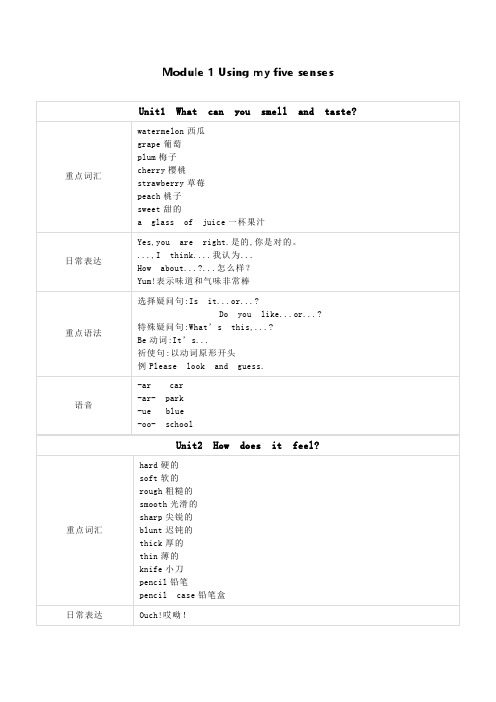
Unit1 A music class
piano 钢琴 violin 小提琴 triangle 三角铁 drum 鼓 music 音乐
特殊疑问句:What can you Whose...is it? Where’s...? 一般疑问句:Is that...?
play?
Unit2 Festivals in China
is sits
What time is it?几点了? It’s so much fun.好有趣。 It’s time for...到做...的时间了 All right.好的。
特殊疑问句:What are you doing? What time is it?
语音
重点词汇
重点语法 语音
关于时间的表达:例 seven o'clock, a quarter past seven, half past seven, a quarter to eight
频率副词:always,usually,often... 一般现在时:例 Peter goes to school from Monday to Friday. 介词:on
-ay May -ai- wait
重点词汇 重点语法
重点词汇 日常表达 重点语法
重点词汇
Module 4 More things to learn
the Spring Festival 春节 the Dragon Boat Festival 端午节 the Mid-autumn Festival 中秋节 the Double Ninth Festival 寒食节 festival 节日 rice dumpling 粽子 dragon boat races 龙舟赛 climb mountains 爬山 visit old people 看望老人
四年级英语下册Module4知识梳理(牛津上海版试用本)

M4U1 A Music class知识梳理一、重点词汇(需背默):piano钢琴、violin小提琴、triangle三角铁,三角形、drum鼓、piper吹笛人、full满的,饱的、gold金子、city城市、happen发生、return返回、rubber bands 通常、musical音乐的、instrument器具二、重点词组(需背默):play the piano 弹钢琴、play the violin 拉小提琴、play the triangle敲三角铁、play the drum敲鼓、a guessing game一个猜谜游戏、be full of充满了…、e to do sth. 来做某事、play beautiful music 演奏出美妙的音乐、walk away from the city 从城市中走开、give sb. sth. 给某人某位=give sth. to sb. 、go back home回家、a bag of gold 一包金子、in return回报、musical instrument乐器、Music class 音乐课、music room音乐教室三、重点句型(需背默):What happens? 发生了什么?四、语法知识:反义词:full饱的hungry 饿的full 满的empty 空的M4U2 Festivals in China知识梳理二、重点词汇(需背默):the Spring Festival春节、the Dragon Boat Festival端午节、the Midautumn Festival中秋节、the Double Ninth Festival重阳节、New Year’s Day元旦、New Year’s Eve 除夕、festival节日、during在…期间、relative亲戚、dumpling 饺子、rice dumpling粽子、sweet dumpling汤圆、which哪一个、grade年级、learn学习、important重要的、traditional传统的、money钱、envelope信封、firework烟花、restaurant饭店、race比赛、special特殊的、lantern灯笼、manner 礼仪、chopsticks筷子、fork叉子、blow吹、bubble泡泡、polite礼貌的二、重点词组(需背默):festivals in China=Chinese festivals 中国的节日、visit relatives拜访亲戚、Class3 Grade 4四年级三班、old people’s home敬老院、learn doing sth.学习做某事、an important festival一个重要的节日、e in January or February在一月或二月来到、buy new clothes买新衣服、traditional food 传统食物、have a big dinner 吃一顿丰盛的晚餐、red envelope 红包、watch colourful fireworks看彩色的烟花、at night在晚上、watch dragon boat races看龙舟比赛、eat rice dumplings 吃粽子、look at the beautiful moon 看美丽的月亮、eat mooncakes 吃月饼、eat Double Ninth cakes 吃重阳糕、table manners 饭桌礼仪、blow bubbles 吹泡泡三、重点句型(需背默):1. When is the Spring Festival? It is in January or February.春节在什么时候?它在一月或二月。
牛津版英语四年级下册知识点总结

牛津版英语四年级下册知识点总结以下是牛津版英语四年级下册的知识点总结:Unit 1: Hobbies and Interests- Vocabulary: play, swim, jump, run, dance, skate- Grammar: Present Simple tense (Affirmative, Negative, Interrogative)- Sentence Patterns: I play football. Do you play football? He doesn't play football.Unit 2: At the Zoo- Vocabulary: zoo, keep, feed, see, animal names (e.g. lion, tiger, giraffe)- Grammar: Plural nouns- Sentence Patterns: We see animals. They don't see animals. Unit 3: My Body- Vocabulary: head, eyes, ears, nose, mouth, neck, shoulder, arm, hand, leg, foot- Grammar: Possessive adjectives (my, your, his, her)- Sentence Patterns: My head hurts. His shoulder doesn't hurt. Unit 4: The Weather- Vocabulary: sunny, windy, rainy, cloudy, snowy- Grammar: Present Continuous tense (Affirmative)- Sentence Patterns: It's sunny. It's not rainy.Unit 5: Food and Drink- Vocabulary: apple, banana, orange, cake, hamburgers, sandwiches, milk, juice- Grammar: Countable and Uncountable nouns- Sentence Patterns: I eat an apple. He drinks milk.Unit 6: Our Homes- Vocabulary: living room, bedroom, kitchen, bathroom, garden, house, apartment- Grammar: Possessive pronouns (mine, yours, his, hers)- Sentence Patterns: This is my house. That is her apartment. The garden is ours.Unit 7: In the City- Vocabulary: hospital, supermarket, park, cinema, museum, post office- Grammar: Prepositions of place (in, on, at)- Sentence Patterns: The hospital is in the city. The park is next to the supermarket.Unit 8: Transportation- Vocabulary: bus, train, car, plane, bicycle, boat, helicopter- Grammar: There is/are- Sentence Patterns: There is a bus. There are boats.Unit 9: People and Jobs- Vocabulary: doctor, teacher, firefighter, police officer, chef, musician- Grammar: Present Continuous tense (Negative, Interrogative) - Sentence Patterns: He isn't cooking. Are you playing the piano? Unit 10: Celebrations- Vocabulary: birthday, Christmas, New Year, Halloween,Thanksgiving, Easter- Grammar: Past Simple tense (regular verbs)- Sentence Patterns: I celebrated my birthday. We didn't celebrate Halloween.这些是牛津版英语四年级下册的主要知识点总结,希望对你有所帮助!。
牛津版四年级下册英语知识点总结归纳-最新
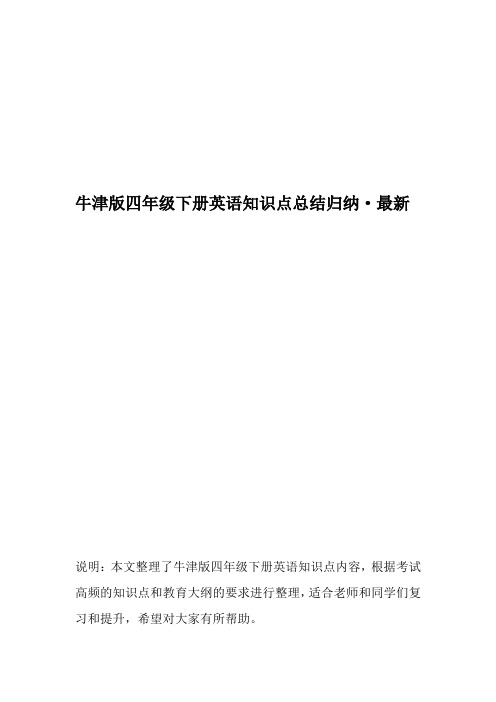
牛津版四年级下册英语知识点总结归纳·最新说明:本文整理了牛津版四年级下册英语知识点内容,根据考试高频的知识点和教育大纲的要求进行整理,适合老师和同学们复习和提升,希望对大家有所帮助。
目录Unit 1 Our school subjects (4)1、语音 (4)2、单词 (4)3、词组 (4)4、句型 (4)5、语法 (5)6、拓展 (5)Unit 2 After school (6)1、语音 (6)2、单词 (6)3、词组 (6)4、句型 (6)5、语法 (6)6、拓展 (7)Unit 3 My day (8)1、语音 (8)2、单词 (8)3、词组 (8)4、句型 (8)5、语法 (8)6、拓展 (8)Unit 4 Drawing in the park (10)1、语音 (10)2、单词 (10)3、词组 (10)4、句型 (10)5、语法 (11)6、拓展 (11)Unit 5 Seasons (12)1、语音 (12)2、单词 (12)3、词组 (12)4、句型 (12)5、语法 (12)6、拓展 (12)Unit 6 Whose dress is this? (14)1、语音 (14)2、单词 (14)3、词组 (14)4、句型 (14)5、语法 (14)6、拓展 (15)Unit 7 What’s the matter? (16)1、语音 (16)2、单词 (16)3、词组 (16)4、句型 (16)5、语法 (16)6、拓展 (16)Unit 8 How are you? (18)1、语音 (18)2、单词 (18)3、词组 (18)4、句型 (18)5、语法 (18)6、拓展 (19)Unit 1 Our school subjects1、语音字母a的读音/ eI / cake grape make skate2、单词1、school 学校 2. subject 课程 3. see 看见 4. Chinese 语文5. Maths 数学6. Music 音乐7. Art 美术8. lesson 课9. Monday 星期一 10.timetable 课程表 11. PE 体育12. Science 科学13. fun 乐趣,快乐 14. afternoon 下午 15. playground 操场3、词组1. our school subjects 我们的学校课程2. what subjects 什么课程3. like Chinese and Maths 喜欢语文和数学4. on Monday 在周一5. have an Art lesson 上一节美术课6. what about you 你呢7. go to the playground 去操场8. this afternoon 今天下午9. this morning 今天上午10. make a cake 做一个蛋糕11. what lessons 什么课12. go to 去13. our new timetable 我们的新课程表4、句型1. Welcome back to school. 欢迎回到学校。
4年级英语下册牛津版核心语法知识点

四年级英语下册牛津版核心语法知识点一、名词在四年级英语下册牛津版中,名词是一个非常重要的语法知识点。
名词是用来表示人、事物、地点或抽象概念的词语。
在学习英语的过程中,名词的单数和复数形式、所有格以及不可数名词的用法都是需要重点掌握的内容。
1. 单数和复数形式在英语中,名词的单数形式和复数形式有着不同的变化规律。
有些名词在后面添加-s构成复数,有些名词要变换其拼写形式,有些名词则是不变的。
cat的复数形式是cats,而child的复数形式是children,而名词sheep的复数形式和单数形式相同。
2. 名词所有格名词的所有格表示所属关系。
在英语中,名词所有格的构成形式有所不同,主要分为添加-apostrophe和-s、只添加-apostrophe以及以-s结尾的名词直接添加-apostrophe等形式。
Tom的书可以表示为Tom's book,而复数名词的所有格形式为添加-apostrophe和-s,例如children的书可以表示为children's book。
3. 不可数名词的用法在四年级英语下册牛津版中,还介绍了不可数名词的用法。
不可数名词表示一类事物的总称,无复数形式,通常用来表示物质、液体、抽象概念等。
water、milk、rice等都属于不可数名词。
在句子中,不可数名词通常用来表示某种状态、特征、性质等。
二、动词动词是句子中最重要的成分,它可以表示行为、状态或动作的发生。
在四年级英语下册牛津版中,动词的时态、语态以及不同形式的用法是需要重点关注的语法知识点。
1. 动词的时态在英语中,动词的时态有着严谨的变化规律,分为一般现在时、一般过去时、一般将来时等。
学生需要掌握不同时态的构成形式和用法,以便能够准确地表达所要表达的时态含义。
2. 动词的语态动词的语态分为主动语态和被动语态。
主动语态表示主语是动作的执行者,而被动语态则表示主语是动作的承受者。
在四年级英语下册牛津版中,学生需要了解被动语态的构成和用法,并能够准确地进行句子转换。
牛津英语四年级下册英语知识点
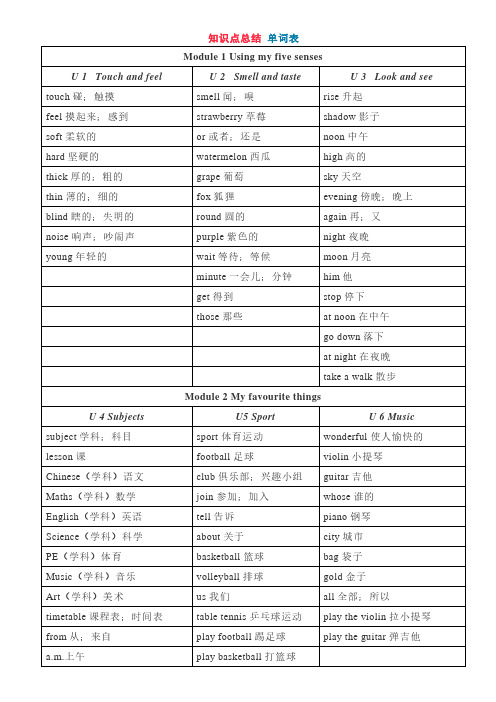
语法复习1. 量词的用法There is a glass of watermelonjuice.There are three glass es of strawberry juice.2. 选择疑问句和一般疑问句的区别(1) 一般疑问句Is thekite red and blue?(这风筝是蓝红色的吗?)一般疑问句的回答必须Yes或No开头Yes, it is./No, it isn’t.(2) 选择疑问句Is thekite red or blue?(这风筝是蓝色还是红色?)选择疑问句的回答必须是二选一:It’s red.或It’s blue.3. 关于like后面接不同的名词和动词like apples / like green ones (可数名词复数)like the apple / like the green one (可数名词单数)like jelly (不可数名词)like dancing=like to dance (动词)would like to dance (would like to do=want to do)be like me/her/his father…(解释为像,作介词)4. 感叹句What nice grapes!(复数)What a nice girl!(单数)5. whose对所有格提问Whose bag is this?-----It’s peter’s.(this/that回答用it’s)Whose knives are those?-----They are his knives. (these/those回答用they’re)6.so和too解释为如此、太时后面跟形容词It’s so thick. /He is so puzzled.It’s too noisy.7. How+助动词+主语+动词The pineapple is rough. (划线提问)Howdoes the pineapple feel?This cherry is sweet. (划线提问)How does this cherry taste?8.祈使句和can句型永远用动词原形,即使有now,也不能是进行时祈使句Let’s make a card now.Kitty, don’t put your book on the floor.(否定句在动词前加don’t)can句型Can Lucy read the book now?(容易犯的错误:看见Lucy一个人就用三单reads,或看见now用进行时)9. There be就近原则,后面所接词必须看清是否是可数名词从而确定be动词There is a cat and two dogs. (离得近的是单数)There are two dogs and a cat. (离得近的是复数)There is some paper. (不可数)There are some paper rabbits. (前面有修饰的名词复数)There are some sheep. (单复数相同)There is some string. (不可数)There is a lot of apple juice. (前面有修饰的不可数)10. both和all 放在be动词之后,do动词之前We are both tall. (be动词之后)They are all blind. (be动词之后)We both run fast. (do动词之前)The brothers all touch the elephant. (do动词之前)11. one of the 复数,谓语三单One of the boy s is Tom.say s one of the brother s12. 一般时和进行时的区别进行时:当句子里有标志性的词如now,look,listen,it’s…几点(祈使句和can句型除外),或是某个有上下情景的句子表示这个动作现在正在发生,结构be+doingListen, birds are singing.Where’s Sam? He is playing football outside.一般时:当句子里有标志性的词如every morning, on Moday, at weedends, always, usually, often,sometimes,never, at…几点等,表示陈述某个事实。
4年级英语下册牛津版核心语法知识点
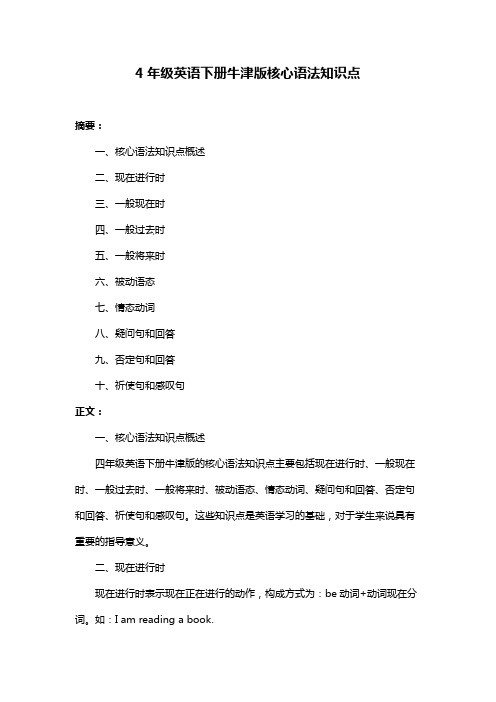
4年级英语下册牛津版核心语法知识点摘要:一、核心语法知识点概述二、现在进行时三、一般现在时四、一般过去时五、一般将来时六、被动语态七、情态动词八、疑问句和回答九、否定句和回答十、祈使句和感叹句正文:一、核心语法知识点概述四年级英语下册牛津版的核心语法知识点主要包括现在进行时、一般现在时、一般过去时、一般将来时、被动语态、情态动词、疑问句和回答、否定句和回答、祈使句和感叹句。
这些知识点是英语学习的基础,对于学生来说具有重要的指导意义。
二、现在进行时现在进行时表示现在正在进行的动作,构成方式为:be动词+动词现在分词。
如:I am reading a book.三、一般现在时一般现在时表示经常或习惯性的动作,构成方式为:主语+be动词(am/is/are)+动词原形。
如:She plays the piano every day.四、一般过去时一般过去时表示过去某个时间发生的动作,构成方式为:主语+be动词(was/were)+动词过去式。
如:He watched a movie yesterday.五、一般将来时一般将来时表示将来某个时间要发生的动作,构成方式为:主语+will+动词原形。
如:We will visit her in summer.六、被动语态被动语态表示动作的承受者,构成方式为:be动词+动词过去分词。
如:The window was broken by the ball.七、情态动词情态动词表示可能性、建议、允许等,如:Can、May、Must、Shall 等。
如:You can watch TV after finishing your homework.八、疑问句和回答疑问句分为一般疑问句、特殊疑问句和选择疑问句,回答时要注意根据实际情况进行肯定或否定回答。
如:1.一般疑问句:Does she like apples?回答:Yes, she does./No, she doesn"t.2.特殊疑问句:What"s your favorite color?回答:My favorite color is blue.3.选择疑问句:Which season do you like best?回答:I like spring best.九、否定句和回答在否定句中,要在be动词、情态动词或助动词后加not。
牛津英语四年级下册知识点
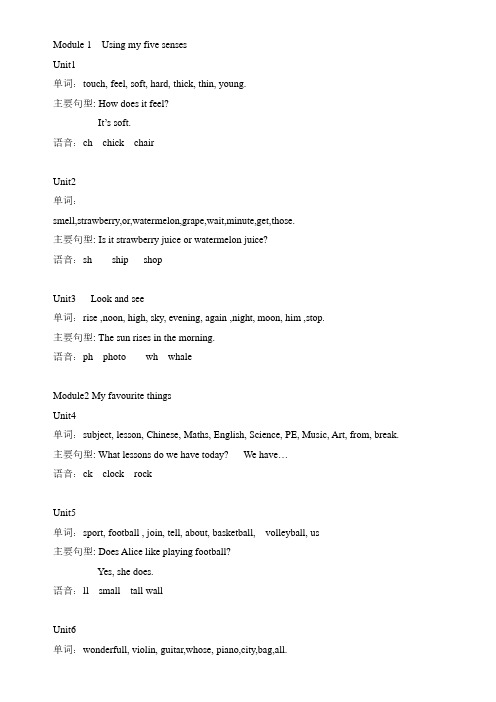
Module 1 Using my five sensesUnit1单词:touch, feel, soft, hard, thick, thin, young.主要句型: How does it feel?It’s soft.语音:ch chick chairUnit2单词:smell,strawberry,or,watermelon,grape,wait,minute,get,those.主要句型: Is it strawberry juice or watermelon juice?语音:sh ship shopUnit3 Look and see单词:rise ,noon, high, sky, evening, again ,night, moon, him ,stop.主要句型: The sun rises in the morning.语音:ph photo wh whaleModule2 My favourite thingsUnit4单词:subject, lesson, Chinese, Maths, English, Science, PE, Music, Art, from, break. 主要句型: What lessons do we have today? We have…语音:ck clock rockUnit5单词:sport, football , join, tell, about, basketball, volleyball, us主要句型: Does Alice like playing football?Yes, she does.语音:ll small tall wallUnit6单词:wonderfull, violin, guitar,whose, piano,city,bag,all.主要句型: Whose guitar is it? It’s Joe’s guitar.语音:ss classroom glass.Module 3 My colourful lifeUnit7单词:o’clock , quarter, time, half, wash, dinner, start.主要句型: Kitty goes to school at a quarter to eight.语音:ff turn off, take off.Unit8单词:Monday, with,Tuesday, Wednesday, Thursday, Friday, game, Saturday, Sunday, clock.主要句型:Peter goes to school library on Monday afternoon.语音:cl clothes pl plant gl glovesUnit9单词:China talk May June January February March April July August September October November December email wear主要句型: How’s the weather in December? It’s sunny and hot.语音:bl blue fl flower sl slowlyModule 4 Things we enjoyUnit10单词:garden plant leaf them grow主要句型: The plant has some big leaves.Unit11单词:song zoo cinema museum also主要句型: On Children’s day, I can …I can …Unit12单词:ugly duck river baby back into。
- 1、下载文档前请自行甄别文档内容的完整性,平台不提供额外的编辑、内容补充、找答案等附加服务。
- 2、"仅部分预览"的文档,不可在线预览部分如存在完整性等问题,可反馈申请退款(可完整预览的文档不适用该条件!)。
- 3、如文档侵犯您的权益,请联系客服反馈,我们会尽快为您处理(人工客服工作时间:9:00-18:30)。
Module1 Using my five senses
Unit1 What can you smell and tastes?
生词:
watermelon grape plum cherry strawberry
音标:
-ar car park -ue blue school
语法:
What is it?
Is it...?
It’s...
Unit2 How does it feel?
生词:
hard soft rough smooth sharp blunt thick thin
音标:
-ir-skirt -ur-purse -au-Laura -oor floor
语法:
Whose ... is this/that/ are these/those?
It’s/They’re...
Unit3 Look at the shadow
生词:
hill lawn path bench
音标:
-ee bee -ea tea -eer deer -ear tear
语法:
It + v.(does)...
Module2 My favourite things
Unit1 Sports
生词:
play football play table tennis play volleyball play badminton play basketball 音标:
-i-five -ie pie
语法:
Does...like...(doing)?
Yes,...does. / No,...doesn’t.
Unit2 Cute animals
生词:
bone cat food parrot fish dog food tortoise
音标:
-oe Joe -oa-goat -o Flo
语法:
What does...(do)?
...(does)...
Eg: What animals do you like? I like cats.
What food does a cat eat? It eats cat food.
Unit3 Home life
生词:
bedroom living room bathroom kitchen
音标:
-oy toy -oi-noise
语法:
...am/is/are...(doing)
Module3 Things around us
Unit1 Sounds
生词:
quiet loud bell television
音标:
-are square -ear bear -air hair
语法:
Is/are...(doing)?
Yes,...is/are. No,...isn’t/aren’t.
Unit2 Time
生词:
seven o’clock a quarter past seven half past seven a quarter to eight get up brush my teeth wash my face have breakfast
音标:
-ou-mouse ow-owl
语法:
What are you doing?
I’m...
What time is it?
It’s...
Unit3 Days of the week
生词:
always usually often sometimes never
音标:
-ay May -ai-wait
语法:
What do you usually do?
Sb. Usually/often/always/sometimes/never ...
Module4 More things to learn
Unit1 A music class
生词:
piano violin triangle drum
音标:
Where’s...?
It’s...
Whose...is this?
It’s...
Unit2 Festivals in China
生词:
the Spring Festival the Dragon Boat Festival the Middle-autumn Festival the Double Ninth Festival
语法:
When is ...Festival?
Is it hot/sunny/...at...Festival?
What do you do in ...Festival?
What special food do you eat at...?
Unit3 Story time
生词:
duckling swan nest。
